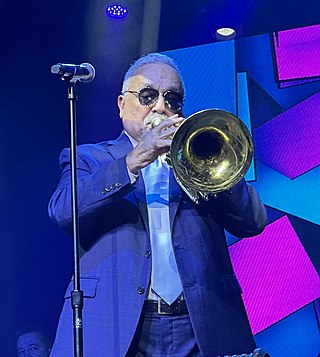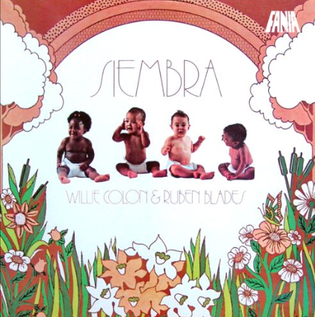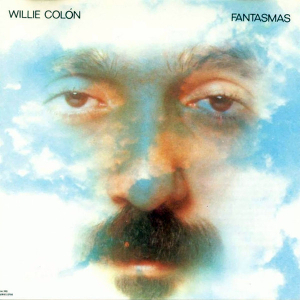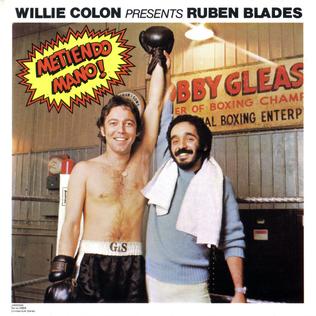Related Research Articles

Rubén Blades Bellido de Luna, known professionally as Rubén Blades, is a Panamanian musician, singer, composer, actor, activist, and politician, performing musically most often in the salsa, and Latin jazz genres. As a songwriter, Blades brought the lyrical sophistication of Central American nueva canción and Cuban nueva trova as well as experimental tempos and politically inspired Son Cubano salsa to his music, creating "thinking persons' (salsa) dance music". Blades has written dozens of hit songs, including "Pedro Navaja" and "El Cantante". He has won twelve Grammy Awards out of 20 nominations and eleven Latin Grammy Awards.
Héctor Juan Pérez Martínez, better known as Héctor Lavoe, was a Puerto Rican salsa singer. Lavoe is considered to be possibly the best and most important singer and interpreter in the history of salsa music because he helped to establish the popularity of this musical genre in the decades of 1960s, 1970s and 1980s. His personality, style and the qualities of his voice led him to a successful artistic career in the whole field of Latin music and salsa during the 1970s and 1980s. The cleanness and brightness of his voice, coupled with impeccable diction and the ability to sing long and fast phrases with total naturalness, made him one of the favorite singers of the Latin public.

William Anthony Colón Román is an American Salsa musician and social activist. He began his career as a trombonist but also sings, writes, produces and acts. Colón is considered a pioneer of Salsa music and a best-selling artist in the genre, having been a key figure in the nascent New York City scene associated with the legendary Fania Records. He is also noteworthy for having assumed the gangster image in his album covers before it was culturally popular. Since the 1980s he has at times been deeply involved in the politics of New York City.
Mon Rivera is the common name given to two distinct Puerto Rican musicians, namely Monserrate Rivera Alers and his oldest son, Efraín Rivera Castillo, . This article refers mainly to Efraín Rivera Castillo, a popular band leader known in salsa, plena and Latin jazz circles.

Contra la Corriente is the third studio album released by American singer Marc Anthony on October 21, 1997, by RMM Records. The album was produced by Puerto Rican musician Angel "Cucco" Peña, with most of the songs written by Panamanian composer Omar Alfanno. The album was well received by critics who praised the vocals of Anthony as well as the songs. The album produced six singles, four of which peaked on the top ten on the Hot Latin Tracks chart. Promoted by a sold-out concert in Madison Square Garden, Contra la Corriente became the first salsa album to reach number one on the Top Latin Albums chart and to chart on the Billboard 200.

Comedia (Comedy) is the third solo album by the Puerto Rican musician Héctor Lavoe. It was released on 1978 under the label of Fania Records. It is notable for the song "El Cantante", which was written by Rubén Blades. In 2006, Hispanic included the album on its list of 10 classic salsa albums. The album was named one of the 50 greatest salsa albums of all time by Rolling Stone in October 2024.

La Voz (The Voice) is the debut solo album by Héctor Lavoe, It was released on 1975 under the label of Fania Records. It had two major hits on Latin America and U.S.: "El Todopoderoso" and "Mi Gente".

Siembra (transl. "Sowing") is the second studio album by Panamanian singer and songwriter Rubén Blades and Puerto Rican-American singer and trombonist Willie Colón. It was released through Fania Records on 7 September 1978. It is considered the best selling salsa album in the history of salsa music. Was recorded by Jerry Masucci and Johnny Pacheco at the La Tierra Sound Studios between 1977 and 1978.

Fantasmas (Ghosts) is the second studio album by Willie Colón, released in 1981 by Fania Records. The album was very experimental, experimenting with sounds and rhythms like Zamba, La Plena, Bomba and Disco Music. The album was released in 1981 during the Romantic Salsa period and gave him a musical vehicle to explore his new interests. The album was named one of the 50 greatest salsa albums of all time by Rolling Stone Magazine in October 2024.

Canciones del Solar de los Aburridos is the third studio álbum between the duo of Willie Colón and Rubén Blades released on September 20, 1981, by Fania Records. This being the second most successful album of the duo and the one that comes closest to being a post-boogalo album with the sounds of hard salsa characteristic of the Harlow Orchestra.

Metiendo Mano! is the debut studio album by Puerto Rican-American trombonist and singer Willie Colón and Panamanian singer-songwriter Rubén Blades, released on October 7, 1977, through Fania Records. The album was produced by Colón and Jerry Masucci and is the second of four collaborative duo albums by Colón and Blades. The record includes the song "Pablo Pueblo", which is considered to be one of the initial forays into "conscious" or "intellectual" salsa and was the theme song to Blades' unsuccessful Panamanian presidential bid in 1994. Craig Harris wrote in MusicHound World that the album "not only represents a historic meeting of musical minds but remains a dance-inspiring masterpiece."

Salsa Big Band is the fourth studio album by Rubén Blades and Roberto Delgado & Orquesta, released on 29 April 2017 by Rubén Blades Productions. After the release of Son de Panamá in 2015, also recorded with Delgado & Orquesta, Blades decided to record another album with them, on which included eleven songs. He had previously recorded nine on the songs, and two were covers of songs written by Luis Demetrio and Rene Touzet. Delgado was the producer for the álbum. Blades' principal inspiration for the album was his admiration for the work of Puerto Ricans performers such as Tito Puente, Tito Rodríguez and Willie Rosario, and the big band sounds of the 1950s.
"El gran varón", also known as Simón, el gran varón, or Simón is a salsa song written in 1986 by Omar Alfanno and sung by Willie Colón. The song narrates the story of Simón, a queer person who is rejected by his father for his lifestyle and dies presumably of AIDS, alone in a hospital in New York.

Tras la Tormenta It is the fifth and last studio album made between the American singer Willie Colón and the Panamian Songwriter Rubén Blades. It was released on January 31, 1995, through Sony Tropical, Epic Records and Columbia Records. Recorded at Acme Recordings Studios, being the last great collaboration that the two artists did. It had four singles, "Talento De Televisión", "Homenaje A Héctor Lavoe", "Tras La Tormenta" and "Como Un Huracán", being the first mentioned the most awarded of the album.

A Man And His Music: Poeta del Pueblo also known as Poeta del Pueblo is the fourth compilation album by Rubén Blades released on March 11, 2008. Being together with his album Anthology released on March 27, 2012 similar compilations only that this compilation has more successes in his career in Fania, the album contains songs by Blades in his stay at Fania from 1974 until 1988 with the album With Strings featuring songs like El Cantante, Tiburón, Ligia Elena and Pedro Navaja.

De Panamá a New York It is the debut studio album by Panamian singer-songwriter Rubén Blades and the eleventh for Pete Rodríguez and His Orchestra. Released on 1970 through Alegre Records. Containing outstanding songs such as Descarga Caliente,El Bravo and Juan Gonzáles. Songs that, despite not having the expected success, were the basis for songs like Pedro Navaja, Plástico and Siembra, among others.
José Mangual Jr. is an American Salsa percussionist of Puerto Rican descent, singer and composer best known for his recordings with Willie Colón and Héctor Lavoe during the 1960s and 1970s salsa boom in New York.
Edwin "Eddie" Montalvo is an American percussionist and bandleader of Puerto Rican descent. Born and raised in the Bronx, he best known for playing the Congas for Hector Lavoe, Rubén Blades as well as with the Fania All-Stars.
Darysabel Isales Canas was a Puerto Rican opera singer and actress. She was a soprano. As a singer, Isales performed in Puerto Rico, the United States, Spain, the Dominican Republic and Austria.

Asalto Navideño is a Christmas album by American musicians Willie Colón and Héctor Lavoe. It was released by Fania Records in 1970.
References
- ↑ "Pedro Navaja Has A Life of His Own". www.maestravida.com.
- ↑ "- YouTube". www.youtube.com.
- ↑ "Pedro Navaja (1984) - IMDb" – via www.imdb.com.
- ↑ "La Verdadera Historia de Pedro Navaja". Koubek Center - Miami Dade College. Retrieved 2020-08-18.
- 1 2 3 Bruckner, D. j r (1986-08-08). "Stage: 'Pedro Navaja'". The New York Times. ISSN 0362-4331 . Retrieved 2020-08-18.
- ↑ "Darysabel Isales - Fundación Nacional para la Cultura Popular".
- 1 2 "Exitos para 'La verdadera historia de Pedro Navaja'". La Prensa Panamá (in Spanish). 2003-10-28. Retrieved 2020-08-18.
- ↑ Encarnacion, Mariela (2019-04-03). "Así es el musical "La verdadera historia de Pedro Navaja"". CNN (in Spanish). Retrieved 2020-08-18.
- ↑ VOCERO, Jorge Rodríguez, EL (26 March 2019). "Con "arma secreta" en Pedro Navaja". El Vocero de Puerto Rico (in Spanish). Retrieved 2020-08-18.
{{cite web}}: CS1 maint: multiple names: authors list (link) - 1 2 3 4 Willie Colón & Rubén Blades – Pedro Navaja , retrieved 2020-08-18
- ↑ Bush, John. "Siembra: Review". Allmusic. Rovi. Retrieved 2010-11-24.
- ↑ Cantor-Navas, Judy (31 May 2018). "The 15 Best Salsa Songs Ever: Critic's Picks". Billboard. Retrieved 15 September 2021.
- ↑ "Influencias — Chayanne". Allmusic. Rovi Corporation. Retrieved 2010-11-24.
- ↑ "Emmanuel Presenta...;— Emmanuel". Allmusic. Rovi Corporation. Retrieved 2010-11-24.
- ↑ "'The Flash' gives a nod to a 70s salsa music hit — and to Latino fans". NBC News. 2023-06-16. Retrieved 2023-06-21.
- ↑ Siembra (booklet). Fania Records. 1979.
- ↑ Fernandez, Enrique (4 February 1984). "Fania Taking Blades To Court" (PDF). Billboard . p. 50. Retrieved 22 September 2023.